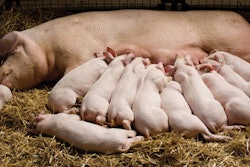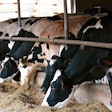
For the first time, Japanese encephalitis (JE) virus has been detected in swine in mainland Australia. As the disease poses a threat to human health, authorities have begun a vaccination program for pig farm workers and other vulnerable groups.
Since mid-January, Japanese encephalitis (JE) has directly affected almost 148,000 pigs at eight farms across three states up to February 21.
According to the official notification, these are the first cases to be detected in mainland Australia.
The report to the World Organisation for Animal Health (OIE) from Australia’s veterinary authority outlines six outbreaks in New South Wales, and one each in Queensland and Victoria. Directly affected over this period were herds of between 550 and 100,000 animals.
On January 19, the first outbreak started at a commercial unit with 24,000 pigs in Grong Grong in southern New South Wales. Signs observed were increases in piglets with neurological symptoms, as well as late abortions and stillbirths. The next outbreak to be confirmed began on February 10 in Corowa in the far south of the state. Here, piglets were showing symptoms of tremors.
Over the next 10 days, the other infections were confirmed in New South Wales, and just over the state border in Victoria, as well as at one farm in northeastern Queensland. At these locations too, tremors in newborn piglets, and reproductive problems in sows were noted.
Identification of the JE virus and genetic sequencing have been carried out at the Australian Centre for Disease Preparedness National Laboratory.
Role of extreme weather events suspected
According to the OIE report, emergence of the disease in mainland Australia represents a significant change in the presence of the JE virus in the country. Previously, serological tests have periodically shown evidence of the virus in the Torres Strait region in northern Australia. However, JE virus had not been detected before January of this year on the mainland.
It is suggested that climatic conditions may be a factor in the emergence of JE in these eastern states. Recently, rainfall has been above average, and minimum temperature higher than usual, the report indicates.
In an already long-running series of extreme weather events in Australia, warnings have been issued by Australian broadcaster ABC for further severe flooding in Queensland and northern New South Wales. Continuing storms and heavy rain have led to evacuation orders in some areas, including metropolitan Sydney.
More on Japanese encephalitis
Causing encephalitis mainly in horses and humans, the JE virus also affects pigs, according to the OIE Terrestrial Manual. It is a notifiable disease. JE occurs across much of Asia, and recently also in the Western Pacific region.
A member of the Flaviviridae family, the virus naturally occurs also in water birds and mosquitoes. In Asia, the most common vector for the virus is Culex tritaeniorhynchus, a mosquito species native to northern Asia and Africa. While wild birds spread the infection in the environment, pigs amplify the virus.
Common signs of JE in pigs are abortions and stillbirths, although there may be no clinical signs in pregnant sows. In horses, common symptoms are reduce feed intake, depression, muscle tremors and ataxia, according to the OIE.
In some Asian countries, two types of vaccines against the disease are commercially available for humans and animals, according to the OIE Manual. Inactivated and live-attenuated options are available for pigs.
JE: threat to human heath
Last week, ABC further reported that the medical authorities have declared JE to be a communicable disease in Australia. After confirmation of the country’s first human case for more than 20 years, the nation’s chief medical officer declared JE an “incident of national significance.”
In people, common signs of JE are neurological symptoms, including headache, convulsions and, sometimes, reduced consciousness. It cannot be transmitted from one person to another. Furthermore, JE cannot be caught by eating pig meat products.
Already by the end of February, seven people in the southeast of the country had been admitted to the hospital with mosquito-borne encephalitis. One patient had died.
Among other measures, this official called for a rollout for human vaccination. This will target at-risk groups, including pig farm workers.
According to this source, the JE virus has been detected at 14 pig farms, and has spread to the state South Australia.















